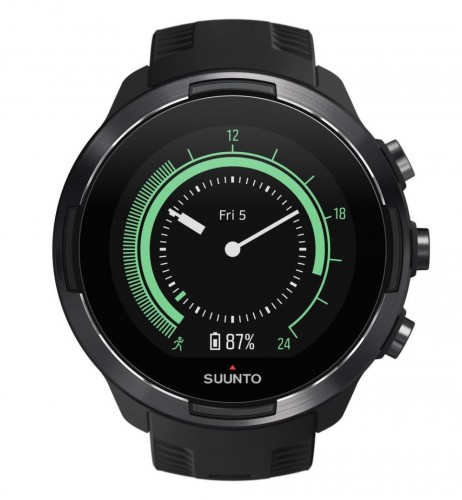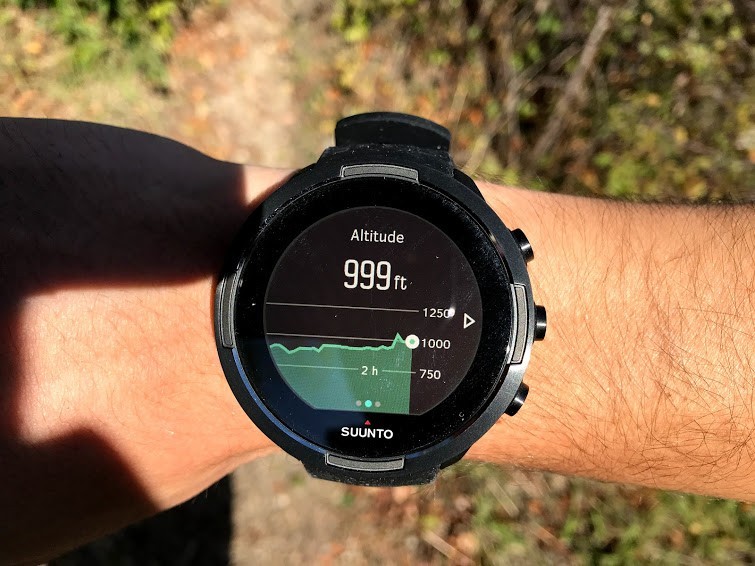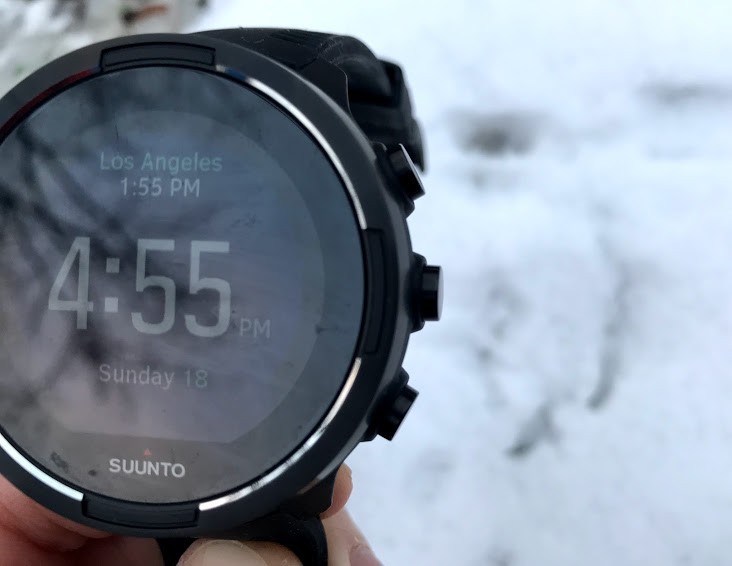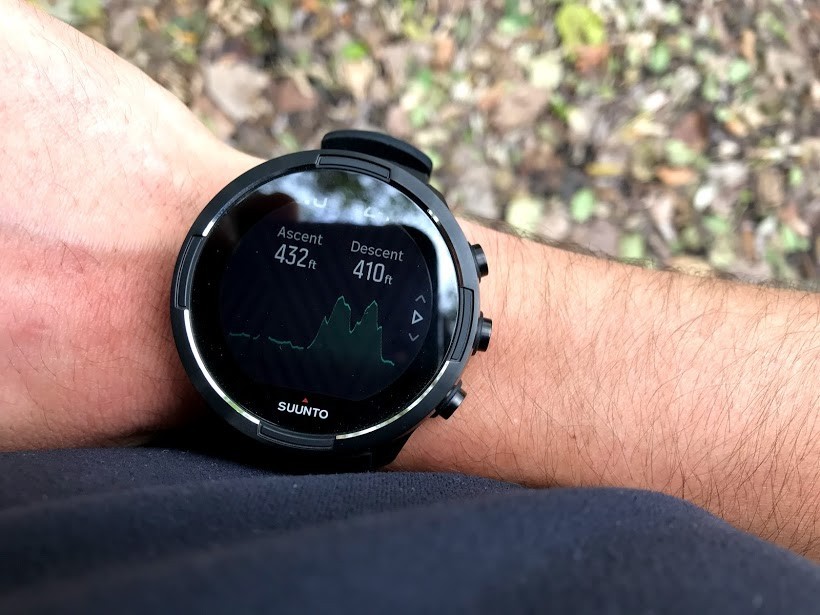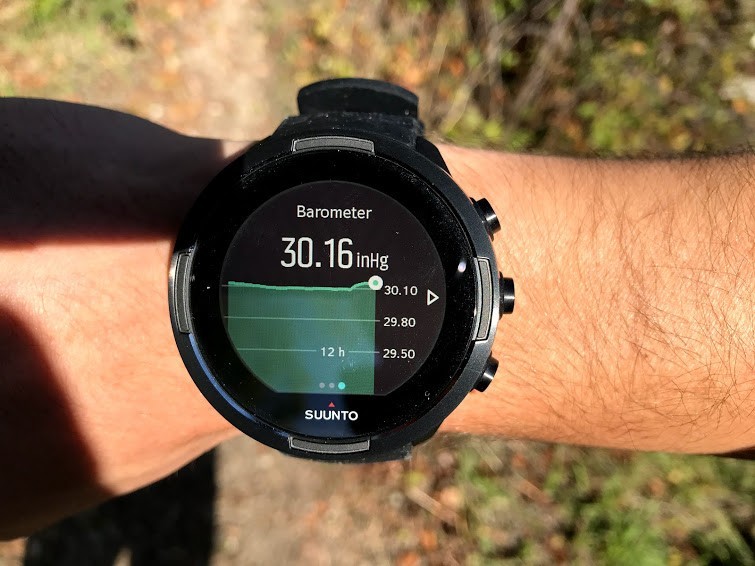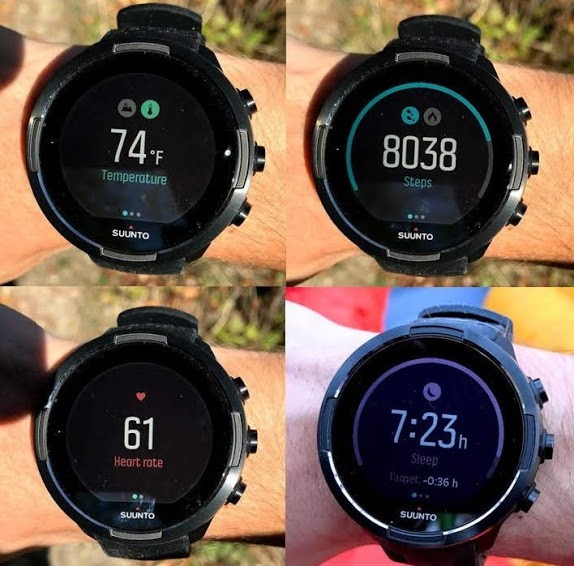Suunto 9 Baro Review
Our Verdict
Our Analysis and Test Results
We worked out with this watch to put it through its paces. On hikes and trail runs, it did not disappoint. This watch performs well across almost all metrics. However, it loses major points for its diminished battery life.
Altimeter Accuracy
We liked what we got with the 9 Baro altimeter. The watch uses both a barometric pressure reference and GPS (a combination Suunto calls FusedAlti), to calculate altitude. During our testing, we found that the measured altitude was usually not more than a hundred feet off of a “true” reference point. One of the reasons that this model doesn't score higher is that there were a couple of odd occasions when it was just really off, often coinciding with the GPS issue described below.
Part of the magic is that this watch will attribute changes in pressure to either elevation gain, or changes in the barometer, depending on whether or not you are ascending. Even as thunderstorms rolled in and out, and the barometric pressure was changing, the measured altitude in the same spot stayed within about 70 feet (other watches that went uncalibrated for a couple of days could be off by a thousand feet or more if the pressure had changed in that time).
Battery Life
The battery life on the 9 Baro is its biggest drawback. All of the tech comes at a cost. This watch lasts just 14 days between recharges if you use minimal features, a week if you have it paired with your phone and receive notifications, and just about 20 hours if you are navigating in the backcountry or otherwise using the GPS.
It does come with intelligent charge reminders, which prompt you to charge the watch at various points depending on the battery level and your usage habits. You can also manually select from performance, endurance, ultra, or custom battery modes to get the most out of the watch (these modes take into account factors like the color display, display shutoff, HR monitor, touchscreen, brightness, vibration, and Bluetooth connectivity to balance watch performance with battery life). We found the specs to be accurate, technically, but in reality, when we were using this watch without trying to either conserve or drain the battery, we were recharging it a little more than once a week.
User experience
The touchscreen is a real gamechanger. This is the only watch that we tested that comes with this feature, and we think that it significantly increases its ease-of-use (though it's not perfect).
The three buttons are intuitive enough — essentially one for up scrolling, one for down, and one for enter/select. We found that they are a little more responsive than the touch screen (especially if its wet, then it doesn't work). But if you find yourself too deep into a menu, or trying to operate it on the move, a few finger swipes will get you back to the watch face.
The display quality on the 9 Baro is excellent. Though it is not as vibrant as the Garmin Fenix 5x Plus Sapphire, it is still sharp, and very easy to read. The screen is large and offers simple, crisp fonts. It has sapphire crystal glass, which is still somewhat reflective in sunlight. Overall though, this watch keeps it simple, usually opting for just a single large number per screen, rather than packing in a ton of data.
Features
The 9 Baro comes packed with features. It keeps the altimeter, barometer, and compass functions fairly accessible, while also offering a whole host of other fitness tracking tech.
Altimeter and Barometer
The altimeter and barometer are solid. The watch records more or less continuously (every second), making for a very complete record of elevation and pressure changes.
You can see basic altitude directly on the timekeeping face. Total ascent and descent are visible during an exercise. Similar to other models, we like the storm alarm, which alerts you to dramatic drops in barometric pressure (4 hPa or more within 3 hours), signaling the arrival of inclement weather. Just as a matter of styling, we don't love how the graphs bleed off of the left side of the watch. We wish there were neat boundaries around all of the edges.
Compass
The digital compass is tilt compensated, which means that you don't have to keep your wrist perfectly level to use it. It is easy to calibrate as well. From the Navigation Settings screen you just have to move the watch in a figure-8 motion a couple of times (we found it was much easier to do this while holding the watch in hand). You can also set a declination in 0.5-degree increments, choose compass units, the position format, and a light or dark color theme.
Also, from the compass screen, you can swipe up to use a variety of different compass-based features like find back. This feature lets you backtrack your trail if you don't happen to know exactly which way that is. If you added them beforehand, you can also navigate to points of interest or follow routes. One nice perk of the compass screen is that it also simultaneously displays the time or battery level to help you monitor those factors.
Timekeeper
This watch performs all of the basic timekeeping functions that you would expect. You can choose from eight different built-in faces, and nine additional color schemes for each of those faces. Just a few button presses or finger swipes and you can set a timer using either the pre-configured intervals or create your own.
The alarm can be set to go off just once, just on weekdays, or every day. It also includes world times. You can choose a second time-zone to appear on the watch face as well.
Fitness Tracker
This watch is as much if not more of a fitness tracker than anything else. It has over 80 different sports modes. The differences between these can be subtle, but selecting one over another changes what the watch measures. For basic running, you get the essentials of time, distance, and pace, plus cadence (max and average), heart rate with graph (min/max, average), time spent in each (customizable) intensity zone, individual lap speeds and average heart rate of specific laps, calories burned, recommended recovery time, total ascent and descent with graph, excess post-exercise oxygen consumption (EPOC), and peak training effect (PTE).
We think it is worth noting that the basic pedometer (not tracking any specific activity) is rather generous with what it counts as a step. It habitually overcounts, adding to the step count total for things like stirring a pot or scratching your head.
GPS
The GPS functionality is incredibly powerful, especially when paired with the Suunto Movescount App. From your phone, you can see heat maps of the most popular road and trail routes, select your course, and load it onto the watch to follow during a workout. Each time you log a run, the watch creates a map of your route.
One word of caution, we did occasionally have difficulty connecting to the GPS satellite system, and there were sometimes gaps in our tracking data, suggesting that the signal went in and out. We also found during that the distance tracked was consistent when running the same course on different days, but varied from other trackers. It calculated that we traveled about 0.1 more miles for every 4 miles covered than other devices. In extreme cases, we were credited with an extra mile for a 6-mile loop.
- Thermometer
- Heart rate monitor
- Pedometer
- Sunrise/sunset
- Calorie consumption
- Sleep timer
- Eight built-in watch faces
- Nine color palettes
- Fitness sharing on social media
Comfort and Fit
This model is very comfortable as well. It's not quite as heavy as the Garmin Fenix 5x Plus Sapphire and that weight makes a difference. Running with one of these models on each wrist, it is very apparent that the 9 Baro is lighter. Its flexible silicone strap has a wide range of adjustability. The strap can be traded out for any other number of other colors and styles (sold separately). It also has two strap securers instead of just one.
It's not as low profile as other models, like the Suunto Core, but we think that its other assets make up for it.
Value
There are many other pieces of more-essential, high-quality gear that you could buy for less. If it's an either-or proposition, make a sound investment in, say, a durable tent instead of this watch. On the flip-side, we think it offers more per dollar than the Garmin Fenix 5x Plus Sapphire. At the end of the day, we would have some difficulty shelling out the money for it, but if an altimeter watch with fancy fitness-tracking features is your thing, then we don't think you'll regret the dollars you spend on this model.
Conclusion
The 9 Baro is a full-featured ABC watch and much, much more. It has an intuitive interface, and its touchscreen is a unique advantage over other models that we tested. If you're in the market for an altimeter watch+, then we highly recommend trying out this model.


